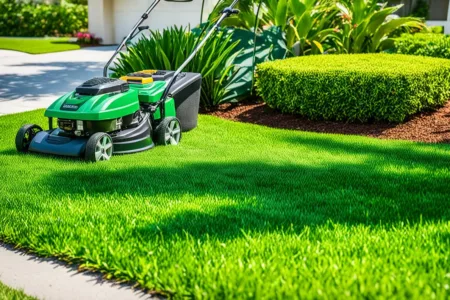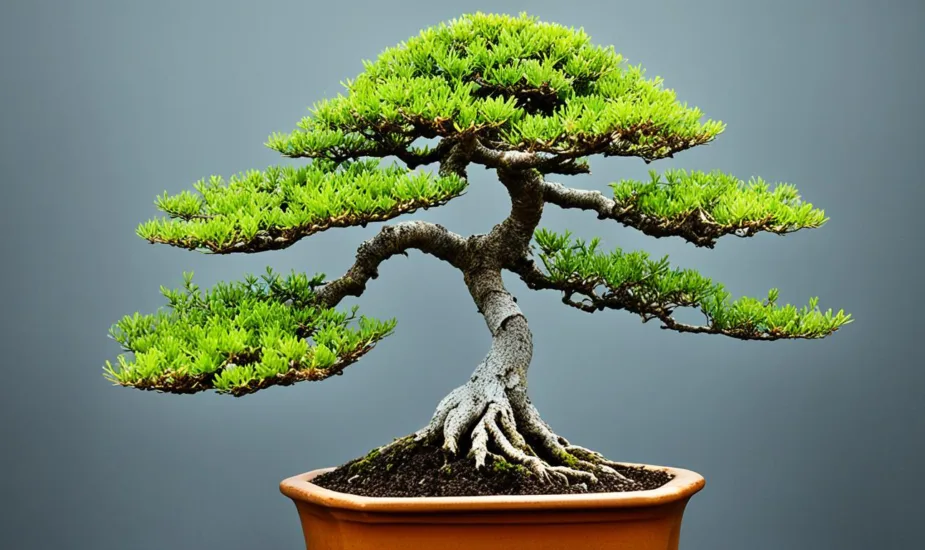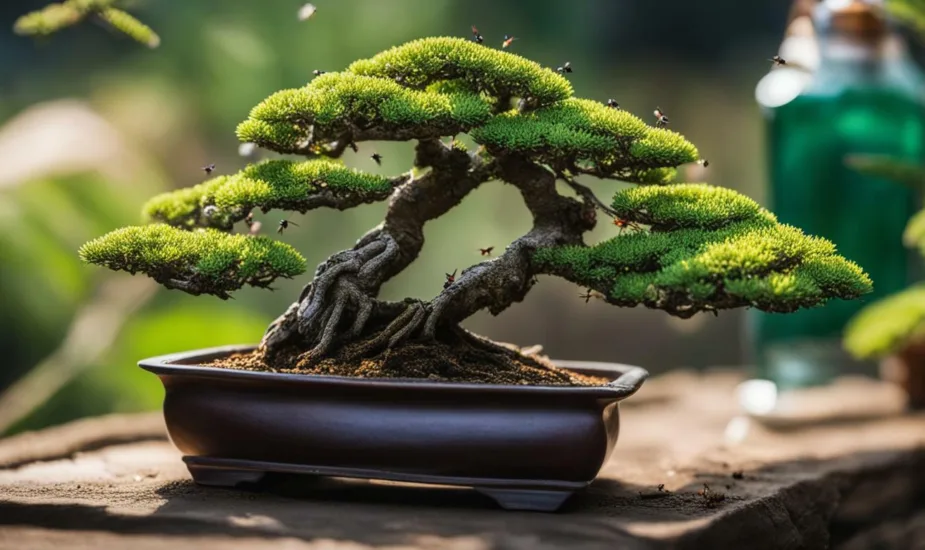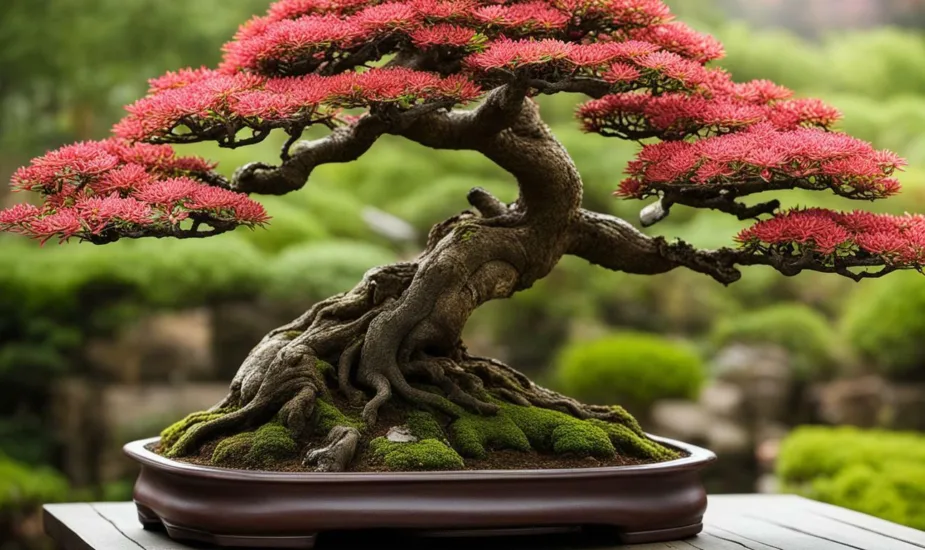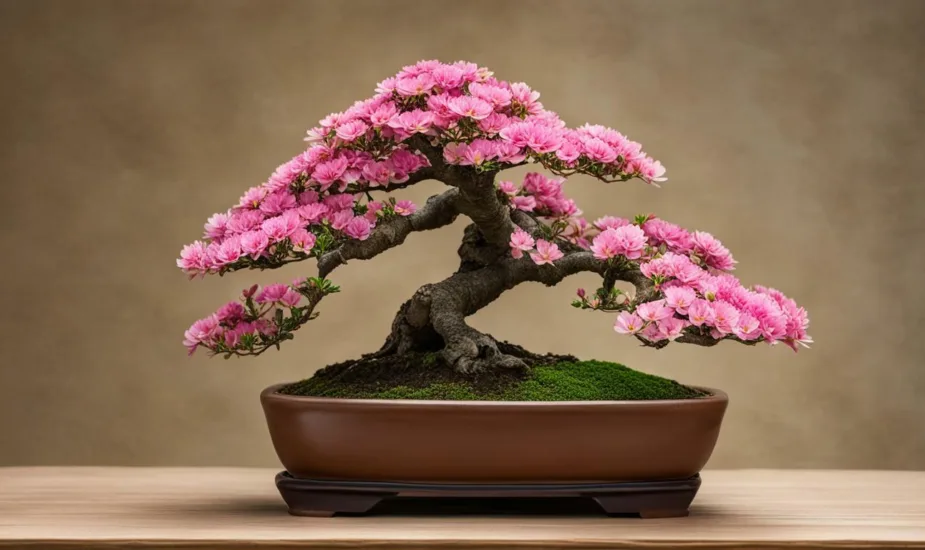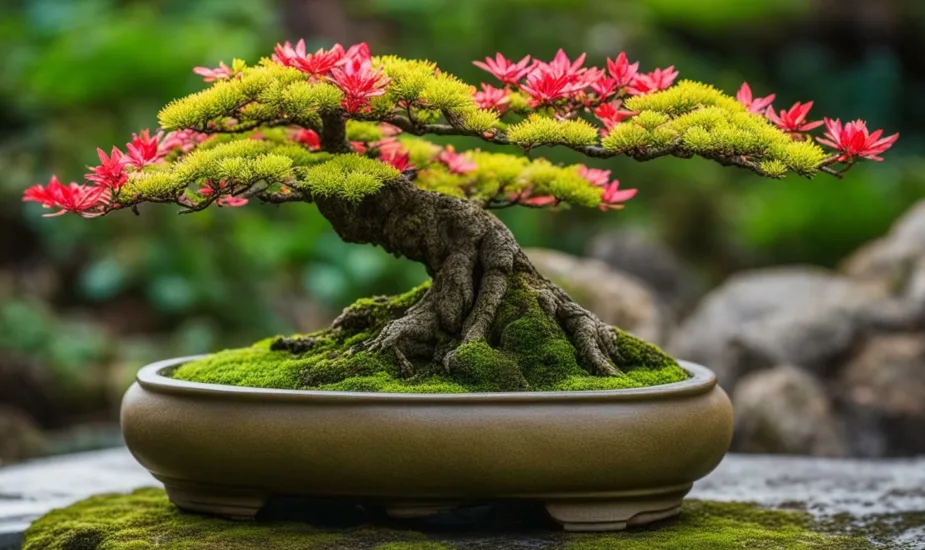Are Bonsai Trees Toxic to Dogs? Unveiling the Truth.
Bonsai trees are a popular choice for plant enthusiasts, but for dog owners, it's crucial to understand whether these miniature trees pose any toxicity risks to our beloved pets. While problems with pets and bonsai trees are rare, it is important to be aware of the tree species that can be toxic.

Understanding the Risk: Bonsai Tree Toxicity in Dogs
While problems with pets and bonsai trees are rare, it’s essential to be aware of the particular tree species that can be toxic to dogs. Bonsai trees, with their unique and delicate appearance, can be a fascinating addition to any home. However, some tree species commonly used for bonsai can pose a danger if ingested by dogs. It’s crucial for dog owners to understand the potential risks and take necessary precautions to ensure the safety of their furry companions.
Among the tree species that can be toxic to dogs are Ficus, Jade, Azalea, Cherry, and Wisteria. These trees contain toxic substances that, if consumed by dogs, can cause various symptoms ranging from mild discomfort to severe poisoning. Common symptoms of bonsai tree toxicity in dogs include vomiting, skin irritation, dehydration, diarrhea, and irregular heartbeat. If you suspect that your dog has ingested a toxic bonsai tree, it is imperative to seek immediate veterinary assistance.
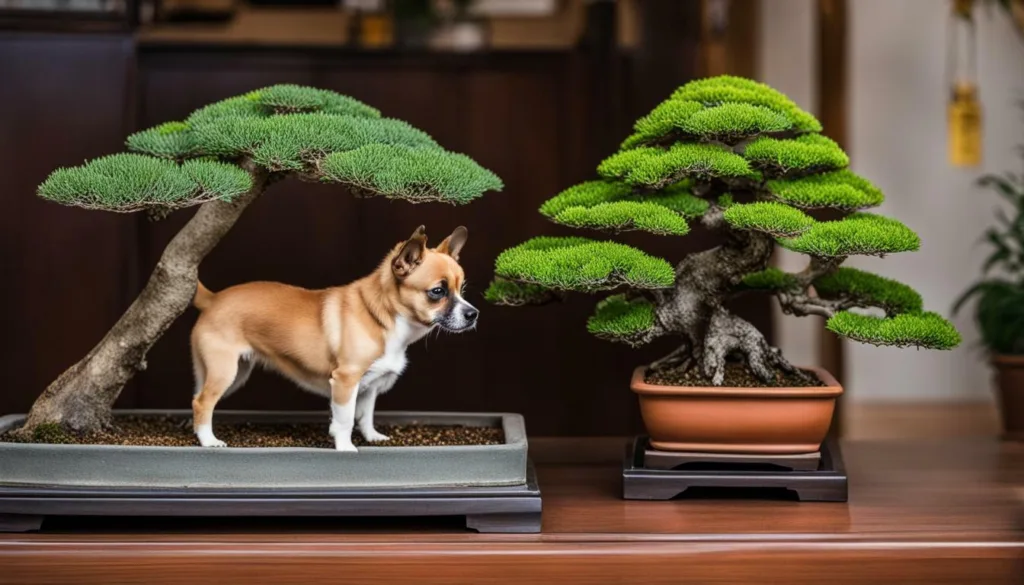
However, it’s important to note that the majority of bonsai trees are not considered toxic to dogs. Safe tree species for bonsai that can be kept without worrying about toxicity include Juniper, Fukien tea, Chinese and Japanese elm, Japanese maple, Pines, Serissa, and Spruce. These tree species can be enjoyed by bonsai enthusiasts who are also pet owners, as they are not known to cause harm when chewed or ingested by dogs.
To prevent dogs from accessing bonsai trees, it is recommended to keep the trees outdoors, in a separate room, or in a specially designated bonsai greenhouse. By taking these precautions, dog owners can ensure the safety of their pets while still enjoying the beauty and artistry of bonsai cultivation. It’s crucial to be aware of the specific tree species and their potential toxicity levels to create a safe environment for both pets and bonsai trees in the home.
Tree Species to Avoid: Identifying Toxic Bonsai Trees
Certain tree species commonly used for bonsai cultivation can pose a threat to dogs if chewed or ingested. It is crucial for dog owners to be aware of these toxic tree species to ensure the safety of their beloved pets.
Some bonsai tree species, such as Ficus, Jade, Azalea, Cherry, and Wisteria, are known to contain substances that can be harmful to dogs when consumed. These toxic plants can cause various health issues, ranging from mild gastrointestinal discomfort to more severe symptoms.
| Toxic Bonsai Tree Species | Potential Effects on Dogs |
|---|---|
| Ficus | Vomiting, diarrhea, skin irritation |
| Jade | Vomiting, depression, lack of coordination |
| Azalea | Vomiting, diarrhea, weakness, difficulty breathing |
| Cherry | Vomiting, diarrhea, rapid breathing, seizures |
| Wisteria | Vomiting, diarrhea, excessive salivation |
While the above-mentioned tree species should be avoided, it is important to note that the majority of bonsai trees are safe to have around pets. There are many bonsai tree species that are not considered toxic and can be enjoyed without worry.
Some popular safe tree species for bonsai include Juniper, Fukien Tea, Chinese and Japanese Elm, Japanese Maple, Pines, Serissa, and Spruce. These trees do not pose a significant threat to dogs if ingested. However, it is always important to monitor your pets and ensure they do not chew on any part of the bonsai tree.

If you suspect that your dog has ingested a toxic bonsai tree or is exhibiting symptoms such as vomiting, skin irritation, dehydration, diarrhea, or irregular heartbeat, it is crucial to seek immediate veterinary assistance. Time is of the essence in these situations, and prompt medical attention can help mitigate any potential harm.
To prevent dogs from accessing bonsai trees, it is recommended to keep the trees outdoors, in a separate room, or in a bonsai greenhouse. This ensures that the pets are unable to reach the trees and reduces the risk of accidental ingestion or chewing. Creating a safe environment for both the bonsai trees and your furry companions is essential for their well-being.
Safe Choices: Dog-Friendly Bonsai Trees
Luckily, there are numerous bonsai tree species that are safe to have around dogs, ensuring both the beauty of your miniature tree collection and the well-being of your furry friend. These pet-safe bonsai trees provide a wonderful addition to your home without posing any toxicity risks. Here are some popular tree species that are considered safe choices for dog owners:
- Chinese Elm: This versatile tree species is known for its elegant shape and beautiful foliage. It is highly adaptable and can thrive both indoors and outdoors.
- Maple: With its vibrant autumn colors, the maple bonsai tree adds a touch of seasonal beauty to any space. It is a hardy tree species that can withstand various climates.
- Juniper: This evergreen bonsai tree is a popular choice among dog owners. It features delicate foliage and is known for its resilience and low maintenance requirements.
- Fukien Tea Tree: With its small, shiny leaves and stunning white flowers, the Fukien tea tree bonsai is a delightful addition to any home. It thrives in bright indoor locations.
These safe tree species not only provide aesthetic appeal but also offer a peaceful and calming presence to your living space. Their pet-friendly nature ensures that you can enjoy your bonsai tree collection without worrying about potential harm to your beloved pets.
When caring for bonsai trees around dogs, it is important to follow some basic guidelines to maintain the safety and well-being of both your pet and your miniature trees:
- Place the bonsai trees in an area where your dog cannot easily access them. This could be outdoors, in a separate room, or in a bonsai greenhouse.
- Regularly inspect the trees for any fallen leaves, fruits, or other plant parts that your dog may be tempted to chew on.
- Keep the bonsai trees well-watered and properly fertilized to ensure their health and vitality.
- Monitor your dog’s behavior around the bonsai trees and discourage them from interacting with the plants.
By following these simple care tips, you can create a safe and harmonious environment where both your bonsai trees and your furry friend can thrive.
| Bonsai Tree Species | Safety Level |
|---|---|
| Chinese Elm | Safe |
| Maple | Safe |
| Juniper | Safe |
| Fukien Tea Tree | Safe |
Remember, it is essential to be aware of the specific tree species and their toxicity levels to ensure the safety of your pets. By selecting safe bonsai tree species and implementing proper care measures, you can enjoy the beauty of these miniature trees while keeping your four-legged companions happy and healthy.
Symptoms of Bonsai Tree Toxicity in Dogs
If a dog ingests a toxic bonsai tree, it’s important to be able to identify the symptoms of poisoning in order to seek prompt veterinary assistance. Dogs may exhibit a range of symptoms that can vary depending on the specific tree species and the amount ingested. It’s crucial for dog owners to be vigilant and watch for any signs of distress or abnormal behavior.
Common Symptoms of Bonsai Tree Toxicity in Dogs:
- Vomiting: Dogs may experience repeated episodes of vomiting, which can be a clear indication of poisoning. It’s important to monitor the frequency and consistency of the vomit, as well as any presence of blood or foreign objects.
- Skin Irritation: Ingesting a toxic bonsai tree may cause skin irritation or allergic reactions in dogs. Watch out for redness, swelling, itching, or rashes on the dog’s skin. These symptoms may occur in areas that come into contact with the plant, such as the mouth or paws.
- Dehydration: Dogs may become dehydrated after ingesting a toxic bonsai tree. Signs of dehydration include excessive thirst, dry gums, sunken eyes, and a lack of skin elasticity. It’s important to ensure that your dog has access to fresh water and consult a veterinarian if dehydration is suspected.
- Diarrhea: Digestive upset, including diarrhea, can be a common symptom of bonsai tree toxicity in dogs. Keep an eye on the frequency, consistency, and color of your dog’s stools. Diarrhea that persists for more than 24 hours or contains blood should be addressed by a veterinarian.
- Irregular Heartbeat: In severe cases of bonsai tree poisoning, dogs may experience irregular heartbeats or cardiac abnormalities. If you notice any changes in your dog’s breathing or heartbeat, seek immediate veterinary assistance.
If you observe any of these symptoms or if you suspect that your dog has ingested a toxic bonsai tree, it is crucial to contact a veterinarian right away. Prompt medical attention can help prevent further complications and ensure the well-being of your furry friend.
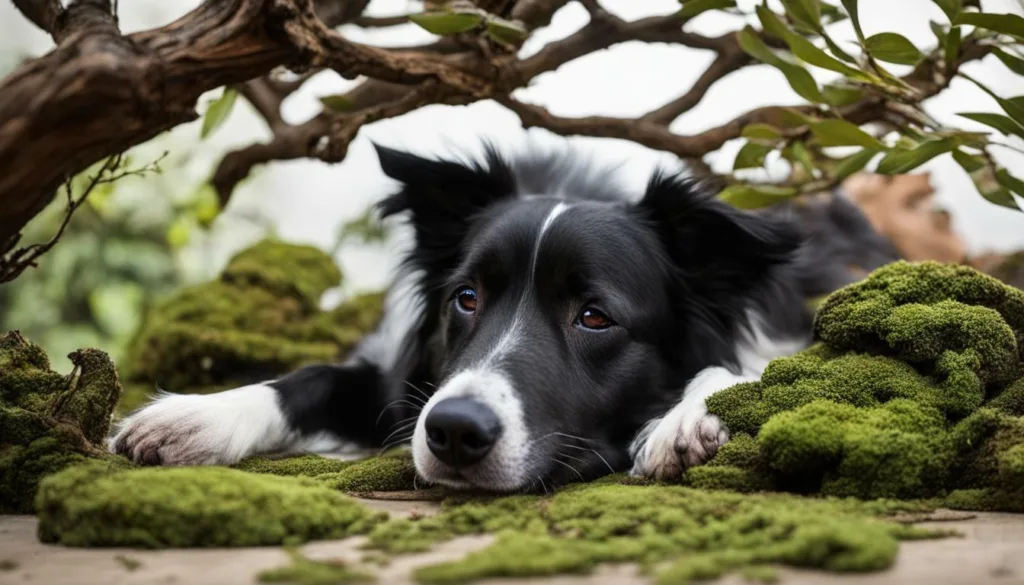
| Symptoms | Description |
|---|---|
| Vomiting | Repeated episodes of throwing up, potentially with blood or foreign objects present. |
| Skin Irritation | Redness, swelling, itching, or rashes on the skin, especially in areas that come into contact with the plant. |
| Dehydration | Excessive thirst, dry gums, sunken eyes, and lack of skin elasticity due to fluid loss. |
| Diarrhea | Frequent loose or watery stools, potentially with blood, lasting for more than 24 hours. |
| Irregular Heartbeat | Abnormal cardiac rhythm or breathing patterns, indicating severe poisoning. |
Being able to recognize the symptoms of bonsai tree toxicity in dogs is vital for their well-being. Remember to always supervise your pet around plants, and if you suspect poisoning, seek immediate veterinary assistance to ensure the best possible care for your furry companion.
Preventing Access: Bonsai Tree Safety Measures for Dog Owners
Taking preventive measures can help dog owners minimize the risk of bonsai tree-related incidents and ensure the safety of their four-legged friends. While the majority of bonsai trees are safe for pets, there are some steps you can take to create a safer environment for your dogs.
First and foremost, consider keeping your bonsai trees outdoors. This allows for natural air circulation and reduces the risk of accidental ingestion by your pets. If outdoor space is limited, you can designate a separate room or area in your home for your bonsai trees. This way, you can create a clear boundary between your pets and the trees, minimizing the chance of any accidents.
If you have multiple bonsai trees and want to display them indoors, consider investing in a bonsai greenhouse or enclosure. This not only adds an aesthetic touch to your home but also serves as a protective barrier, keeping your pets away from the trees.
Additionally, it’s important to ensure that your dogs are well-trained and understand boundaries. Teaching them to stay away from the bonsai trees will go a long way in preventing any potential incidents. Remember to provide plenty of alternative toys and chewing options for your pets to redirect their attention away from the trees.

| Tree Species | Pet-Safe Rating |
|---|---|
| Chinese Elm | Safe |
| Maple | Safe |
| Juniper | Safe |
| Fukien Tea Tree | Safe |
By following these safety measures, you can enjoy the beauty of bonsai trees while keeping your dogs safe. Remember to research specific tree species and their potential toxicity levels before introducing new bonsai trees to your home. If you suspect your dog has ingested a toxic bonsai tree or is showing any symptoms of poisoning, seek immediate veterinary assistance. With awareness and caution, you can create a harmonious environment for both your pets and your bonsai trees.
Conclusion: Ensuring Pet Safety with Bonsai Trees
While the majority of bonsai trees are safe for dogs, it’s crucial for dog owners to be informed about potential risks and take necessary precautions to protect their pets. Bonsai trees can add beauty and tranquility to our homes, but certain tree species can pose a threat if ingested by dogs. It’s important to be aware of toxic tree species and their potential effects on our canine companions.
Some popular bonsai tree species, such as Ficus, Jade, Azalea, Cherry, and Wisteria, can be toxic to dogs if consumed. These trees contain substances that can cause digestive disturbances, skin irritation, dehydration, or more serious health issues. However, it’s worth noting that the majority of bonsai trees are safe and non-toxic for pets.
To ensure the safety of our furry friends, it’s recommended to avoid toxic tree species and opt for pet-friendly bonsai trees instead. Some examples of dog-friendly bonsai tree species include Chinese Elm, Maple, Juniper, and Fukien Tea Tree. These trees can be safely enjoyed in the presence of pets without posing any toxicity risks.
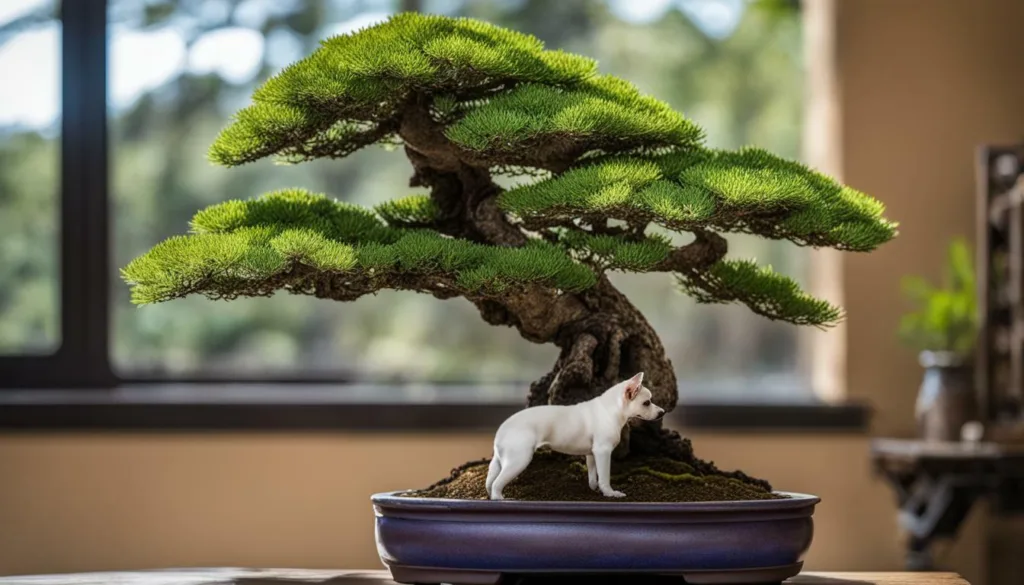
If you suspect your dog has ingested a toxic bonsai tree, it’s crucial to seek immediate veterinary assistance. Symptoms of bonsai tree toxicity in dogs may include vomiting, skin irritation, dehydration, diarrhea, and irregular heartbeat. Prompt veterinary care is essential to ensure the well-being of your pet.
Preventing access to bonsai trees is another important aspect of ensuring pet safety. Keep bonsai trees outdoors, in a separate room, or in a bonsai greenhouse to prevent curious pets from chewing on the leaves or fruits. By implementing these simple safety measures, you can enjoy the beauty of bonsai trees while keeping your furry friends safe and healthy.
Conclusion
Bonsai trees can bring beauty and tranquility to your home, but as a dog owner, it’s essential to prioritize the safety and well-being of your beloved pets when incorporating these miniature trees into your living space.
While problems with pets and bonsai trees are rare, it is important to be aware of the tree species that can be toxic. Some toxic tree species to avoid include Ficus, Jade, Azalea, Cherry, and Wisteria. However, the majority of bonsai trees are not considered toxic and are safe to have around pets.
Some popular safe tree species for bonsai that won’t pose any toxicity risks include Juniper, Fukien tea, Chinese and Japanese elm, Japanese maple, Pines, Serissa, and Spruce. These pet-safe options allow you to create a beautiful bonsai collection without worrying about potential harm to your furry friends.
If a dog ingests a toxic bonsai tree, they may experience symptoms such as vomiting, skin irritation, dehydration, diarrhea, and irregular heartbeat. It is important to seek immediate veterinary assistance if poisoning is suspected. Early intervention can make a significant difference in a dog’s chances of recovery.
To prevent dogs from accessing bonsai trees, it is recommended to keep the trees outdoors, in a separate room, or in a bonsai greenhouse. This will ensure the safety of both the bonsai trees and your four-legged companions, reducing the risk of accidental ingestion or other potential hazards.
Remember, responsible pet ownership means being aware of the specific bonsai tree species and their potential toxicity levels. By staying informed and taking appropriate precautions, you can enjoy the beauty of bonsai trees while keeping your dogs safe and healthy.
FAQ
Q: Are bonsai trees toxic to dogs?
A: Bonsai trees can potentially be harmful to dogs if they chew on the leaves or fruits of toxic tree species. However, the majority of bonsai trees are not considered toxic and are safe to have around pets.
Q: Which tree species should I avoid if I have a dog?
A: Some tree species that are toxic to dogs and should be avoided in bonsai form include Ficus, Jade, Azalea, Cherry, and Wisteria.
Q: What are some safe bonsai tree species for dogs?
A: Safe tree species for bonsai that are considered pet-friendly include Juniper, Fukien tea, Chinese and Japanese elm, Japanese maple, Pines, Serissa, and Spruce.
Q: What are the symptoms of bonsai tree toxicity in dogs?
A: If a dog ingests a toxic bonsai tree, they may experience symptoms such as vomiting, skin irritation, dehydration, diarrhea, and irregular heartbeat. It is important to seek immediate veterinary assistance if poisoning is suspected.
Q: How can I prevent my dog from accessing bonsai trees?
A: To prevent dogs from accessing bonsai trees, it is recommended to keep the trees outdoors, in a separate room, or in a bonsai greenhouse. This will ensure the safety of both the bonsai trees and the dogs.
 Little Garden Tips
Little Garden Tips

